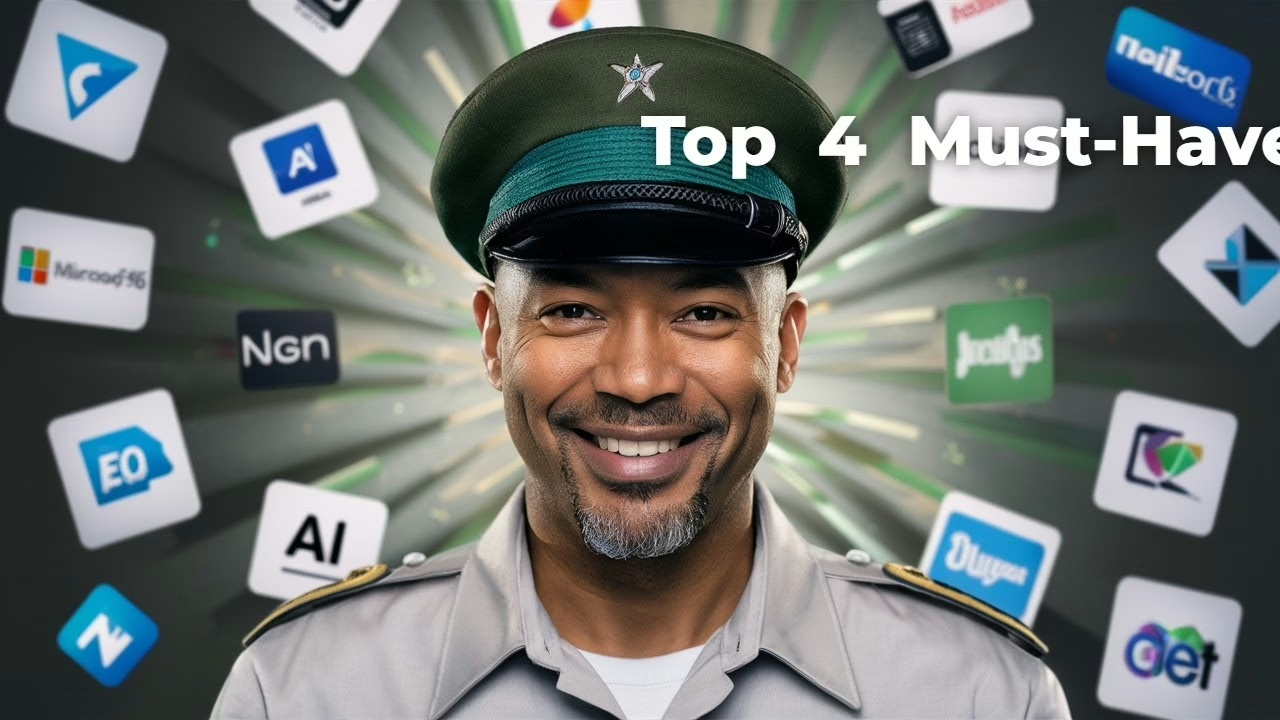Picture this: It’s 2 AM, your DD-214 is dog-eared, coffee’s gone cold, and you’re staring at a mountain of job boards that all start to look the same. Been there. I’m Alan Davis, a veteran myself, and when I first heard about using AI for job hunting, I laughed out loud. But as it turns out, this tech isn’t just another fad—it’s become one of the most powerful allies for veterans looking to crush it in the civilian workforce.
Translating Your Story: AI Resume Builders for Real Impact
Let me be brutally honest with you. If you’re not leveraging AI in your job search, you’re fighting with one hand tied behind your back. I learned this the hard way after writing “squad leader” on my resume about fifty times before discovering AI resume builders that could actually translate what I really did into language that civilian HR departments understand.
Here’s the thing that nobody tells you about military experience translation: you’re not just changing words—you’re completely reframing your value proposition. When I led a team of twelve soldiers through complex operations, that wasn’t just “squad leadership.” That was project management, crisis response, resource allocation, and team development all rolled into one. But how do you communicate that without sounding like you’re speaking in military code?
AI Resume Builders That Actually Get It
The game has completely changed. AI-powered resume tools now analyze military roles and automatically translate your achievements into civilian-friendly accomplishments that make HR departments sit up and take notice. These aren’t generic one-size-fits-all templates—they’re smart systems that understand the depth of military experience.
Research shows that AI resume matching tools help veterans find jobs faster by analyzing resumes beyond simple keywords. Military hiring platforms like Bridge My Return use AI-driven skills-matching algorithms that dig deeper into your actual capabilities, not just the surface-level job titles.
What makes these tools revolutionary is their ability to hunt for the exact keywords and skills that specific employers are seeking. No more throwing resumes into the void and hoping something sticks. The AI identifies critical requirements from job descriptions and highlights how your military experience directly addresses them.
The ATS Reality Check
Here’s what shocked me: optimizing resumes for ATS compliance isn’t optional anymore—it’s survival. Employers are using AI to sift, sort, and select candidates before any human ever sees your application. If your resume isn’t speaking the right language to these systems, you’re invisible.
ATS compliance means understanding that robots are literally reading your resume first. Military skills translators built into top resume builders ensure your achievements pass through these digital gatekeepers. They rephrase your military accomplishments into precision applications that demand attention from both AI systems and hiring managers.
The old ways of resume writing? Dead, gone, finished. The veteran career transition landscape now requires you to work faster and smarter. AI ensures your value isn’t lost in translation between military service and civilian opportunity.
This isn’t cheating—it’s adapting and overcoming in a job market that has fundamentally shifted. Your years of dedication, skills, and leadership deserve to be presented in a way that creates opportunities, not barriers. Military skills translators level the playing field by making sure your real-world experience gets the recognition it deserves.
Finding the Hidden Doors: AI-Powered Job Matching Platforms
Let me ask you something—are you sick of sending your resume into the void? I’ve been there. Months of scrolling through endless job boards, firing off that same resume into what feels like a digital black hole. That was the old way, and honestly, it was soul-crushing.
But here’s where everything changes. AI-driven platforms actually match instead of just searching. These aren’t your typical job boards where you’re competing with thousands of other applicants for roles that might not even fit. Research shows that AI tools in workforce agencies are now standard for matching veterans with jobs, and the results speak for themselves.
These job matching algorithms use machine learning to understand your skills, experience, and career goals. Then they do something magical—they match you with job openings that are a genuine fit. For veterans like us, this is honestly a godsend. These AI systems understand military experience and connect it to civilian roles, uncovering opportunities you might never find on your own.
Take platforms like Bridge My Return (BMR)—I’m not kidding when I say I landed my first corporate gig this way. Their AI-driven job matching algorithm didn’t just look at keywords on my resume. It understood that my logistics coordination experience translated perfectly to supply chain management roles I’d never even considered. Military-focused platforms apply AI-driven skills-matching for targeted results that actually make sense.
Why AI Gets What Civilian Buddies Don’t
Here’s the thing about machine learning systems that understand military backgrounds—they’re better than any civilian buddy ever could be at translating your experience. Your friend might suggest “project management” when you mention leading missions, but AI tools for veterans dig deeper. They connect your tactical planning skills to strategic business roles, your team leadership to executive positions, your crisis management to operations director opportunities.
These hiring platform veterans are using integrate directly with employer applicant tracking systems (ATS), which means your profile gets ranked higher based on actual job requirements. You’re not just another resume in a pile—you’re a strategically matched candidate.
The beauty of these military hiring platforms is they speak our language. They understand that “mission-critical operations” means you can handle high-pressure business environments. They know that “cross-functional team leadership” translates to modern collaborative management styles.
This isn’t about gaming the system—it’s about veteran career transition support that actually works. When AI analyzes your military experience against thousands of civilian job requirements, it finds connections you’d miss. It opens doors to industries you didn’t know were looking for exactly what you bring to the table.
The civilian job market doesn’t have to feel like enemy territory anymore. With AI-powered job matching, you’re not shooting in the dark—you’re making precision strikes on opportunities that genuinely value your military experience.
Sweating the Interview? AI Coaching Makes You a Civilian Pro
Let’s be honest: facing a civilian interview after years away is a stomach-turner. I’ve been there, staring at my computer screen before a Google Meet session, wondering how to translate “led a squad through combat operations” into something that doesn’t make the hiring manager’s eyes glaze over. That’s where AI interview coaching becomes a legit game changer—and I wish I’d had one for my first civilian interview disaster.
Here’s the reality: “The interview itself. Especially if you’ve been out of the civilian interview circuit for a while or if you’re transitioning from a vastly different culture like the military, it can be daunting.” Those weird behavioral questions? The pressure to sell yourself without sounding arrogant? Yeah, AI tools for veterans are stepping up to solve exactly these problems.
Forget awkwardly asking your spouse to pretend to be the hiring manager while they Google random questions. Interview preparation tools powered by AI offer something way more sophisticated. These platforms generate mock interviews—often using video—then provide instant, data-driven feedback on everything from your answers to your delivery, pacing, and even those “ums” you didn’t realize you were saying.
What blows my mind is how some advanced tools are starting to analyze non-verbal cues too. They’re watching your posture, eye contact, hand gestures. It’s like having a professional interview coach available 24/7, except this one never gets tired of your practice sessions.
Tailored Questions That Actually Matter
The real power move? Input the job description you’re interviewing for, and these AI tools for veterans generate relevant practice questions. No more generic “tell me about yourself” prep. We’re talking targeted questions that mirror what you’ll actually face.
Research shows that interview preparation and AI coaching are crucial for veterans job search success. These platforms help structure your responses using frameworks like STAR (Situation, Task, Action, Result), which is perfect for those behavioral questions designed to see how you’ve handled past situations.
STAR isn’t just corporate buzzword nonsense—it’s your secret weapon for framing military experience for civilian ears. Instead of saying “I managed logistics for my unit,” you craft it: “When our supply chain faced a critical shortage (Situation), I was tasked with ensuring mission readiness (Task), so I developed alternative sourcing strategies and cross-trained personnel (Action), resulting in zero mission delays and 30% cost savings (Result).”
These tools ensure your answers aren’t just good—they’re specifically targeted to what that employer is looking for. Your military to civilian jobs transition becomes less about apologizing for your background and more about showcasing how your experience directly solves their problems.
The beauty of AI interview coaching is that it transforms preparation from a stressful guessing game into a strategic advantage. You walk into that interview knowing exactly how to position your service, your leadership, your problem-solving skills in terms they understand and value.
Wild Card: If I Could Do It Again (Unexpected Lessons From My Transition)
Okay, confession time. The first resume I wrote after leaving the military? I actually listed my MRE packing skills. Yes, you read that right. I thought showcasing my ability to efficiently organize field rations would somehow impress Fortune 500 recruiters. Spoiler alert: my phone stayed silent for weeks.
But here’s where the story gets interesting. When I finally discovered AI-powered job application tools, something unexpected happened. Those “weird” features I initially ignored—like detailed skills analysis and military experience translation—became absolute game-changers for my military to civilian transition.
The AI didn’t just help me rewrite my resume. It helped me see myself differently. Those attention-to-detail skills I developed managing inventory? The AI highlighted how that translated to supply chain management and quality assurance roles. My leadership experience coordinating team missions? Suddenly that became “cross-functional project management with measurable outcomes.”
‘Your resume represents years of dedication, skills, and leadership.’
Research shows that veteran employment resources enhanced by AI can identify hidden strengths veterans don’t even realize they possess. The technology goes beyond basic keyword matching—it analyzes the deeper competencies embedded in military experience.
But here’s my biggest revelation: don’t limit AI feedback to just your resume. I started using it for networking messages, cover letters, even salary negotiation conversations. The same military hiring platform tools that helped translate my MOS suddenly made me a more confident communicator across every aspect of job searching.
When I reached out to potential connections on LinkedIn, AI helped me craft messages that felt genuine but professional. During salary discussions, it helped me frame my military leadership experience in terms of budget management and team productivity metrics that civilian employers actually understood.
The truth is, job seeker skills analysis through AI tools enhance veteran career transitions in ways I never expected. It’s not just about getting past applicant tracking systems anymore—it’s about discovering your own value proposition in a language the civilian world speaks fluently.
Your service taught you to adapt and overcome, just like the landscape of job searching continues to evolve. The same resilience that got you through deployment challenges will carry you through career transitions. But now you don’t have to figure it out alone.
The mission continues beyond active duty. Your dedication, skills, and leadership experience aren’t just bullet points on a resume—they’re the foundation for whatever comes next. Whether you’re transitioning today or supporting another veteran in their journey, remember that the right tools can unlock opportunities you didn’t even know existed.
Sometimes the biggest victories come from the smallest adjustments. Trust the process, embrace the technology, and never underestimate the power of your military experience in civilian clothes.
TL;DR: AI is the not-so-secret weapon that can level the playing field for veterans in the job market. From decoding military jargon on your resume to nailing those anxiety-inducing interviews, the right AI tools put you on offense, not defense. Don’t go it alone—let tech be your force multiplier.

